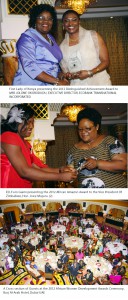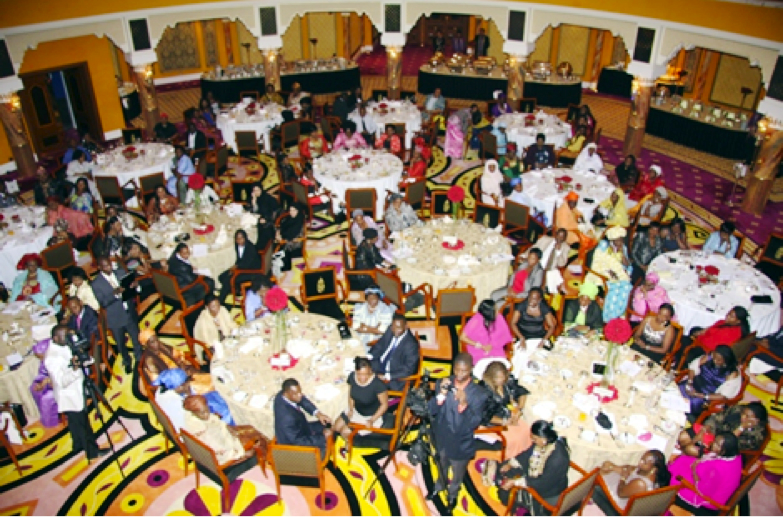- Contact Us
- +447471066570
- info@celd.org.uk
Presentation by the Vice President of Zimbabwe, Honourable Joyce T.R. Mujuru at the Conference on African Women Development and Awards Ceremony
March 30, 2012Acceptance speech for The Distinguished African Amazon Award from the desk of H.E. Dr. Ida B. Odinga M.G.H Wife of the Prime Minister, Republic of Kenya
March 31, 2012Communiqué of the 2012 INTERNATIONAL CONFERENCE ON AFRICAN WOMEN DEVELOPMENT,DUBAI- 27-31 MARCH.

Click to zoom! Pictures form the 2012 International Conference on African Women Development Dubai, UAE
Center for Economic & Leadership Development
Women in Africa continue to face enormous obstacles. The growing recognition of their contributions has not translated into significantly improved access to resources or increased decision-making powers. Neither has the dynamism that women display in the economic, cultural and social lives of their communities through their associations and informal networks been channeled into creating new models of participation and leadership.
Against this background, over 100 African and Non- African Women leaders from diverse spheres of life, converged in Dubai, UAE to attend the 2012 International Conference on African Women Development.
The ICOAWD 2012 was opened by Her Excellency, Hon. Joice Mujuru, the Vice President of Zimbabwe; with a keynote address on the theme: ‘The Role of Women as catalysts for Africa’s Development’. Paper presentations were made by women in the vanguard of promoting and emancipating the African Woman; in the likes of Alice Ukoko of “Women of Africa”, a UK based Woman activist, Mrs Esijolone Okorodudu, Executive Director, Ecobank Transnational Inc. , Togo-Lome, Dr. Hibah Shata, CEO, Specialized Dental Clinic Cosmetic, Laser and Prosthetic Dentistry, and other inspirational Women from the Oil & Gas sector and Women in Government.
ICOAWD 2012 culminated with the 2012 African Women Development Awards (AWDA) Dinner; where Amazons of the African continent, Great women leaders, who are tirelessly contributing to the development of the women in Africa, were honored. Women Leaders present and guests were treated to royalty in the prestigious Burj Al Arab Hotel, Dubai UAE.
The resulting platform for action identified several priorities especially the AU declaration of the Decade of the African Woman. These included combating the increasing poverty of African women; improving women’s access to education and health services, with a special focus on industries; addressing women’s exclusion in politics; increasing the involvement of women in nation building; addressing political violence against women; advancing the legal and human rights of women; gender concerns within economic and development policy-making by disaggregating data along gender lines. The Dubai conference also noted the need for Agricultural Development and Food Security through the creation of enabling structures for women.
The conference stressed the empowerment of women as one of the central development goals of the 21st century. It adopted a platform for action which called for the mainstreaming of a gender perspective in the design, implementation and monitoring of all policies and programmes, including development programmes like micro-financing for women development. It committed countries to design their own specific programmes and activities in consultation with women’s groups and other NGOs to implement the AU declaration of the African woman.
The way forward
The women agreed that, it is critically important for policy-makers to listen to and work with women to improve their positions and thereby accelerate Africa’s development. A comprehensive approach must be taken by governments in conjunction with development agencies and women themselves to remove the social, economic and legal constraints on women.
National action plans must be designed in broad consultation with women’s groups to complement national initiatives. Mrs. Furo Giami the Executive Director of CELD expressed the hope that women would be the shaping medium for nation building in Africa.
Access to resources
Governments and local authorities must demonstrate commitment to removing legal impediments and socio-cultural obstacles against women, especially in the rural areas where the majority of women live and are economically active. The constraints on women’s access to land, credit, extension services, inputs and new technologies must be removed, and opportunities should be created for their enterprise. Measures to improve women’s access through institutional reforms must be pursued and monitored for effectiveness.
Governments must build partnerships with the emerging associations of women bankers and entrepreneurs to create an enabling policy environment. This should include making credit available to women at affordable rates, with the private sector assisting government efforts to get credit to women.
Improving Education and Health
Gender biases in the educational system, training and employment must be consistently attacked to give women new opportunities for achievement, while school curricula must incorporate concepts of gender equality and peace at all levels, so that students will incorporate them throughout their lives. Young women need role models to motivate them and must be given a usable education and skills to play meaningful roles in society and to safeguard them from harmful practices which mortgage their health and lives.
Women’s leadership and organization
Finally, women’s leadership skills in their communities, groups and associations need to be harnessed and formalized to give them political and decision-making power. Women’s commitment to their households, to local and national food security, local production and the environment should be reflected in equitable representation on all bodies that make decisions in these areas, as well as in broader economic programmes that affect women’s lives.
The viability of women’s institutions and mechanisms for decision making in the community, market places and trades must be recognized, and they should be utilized to increase women’s participation and decision-making power in society. ‘Develop the leadership of the African woman, Develop Africa.


